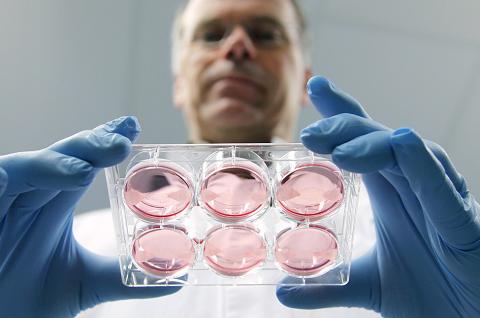Scientists are cooking up new ways to satisfy the world’s ever-growing hunger for meat.
“Cultured meat” — burgers or sausages grown in laboratory Petri dishes rather than made from slaughtered livestock — could be the answer that feeds the world, saves the environment and spares the lives of millions of animals, they say.
Granted, it could take a while to catch on and it will not be cheap.

Photo: Reuters
The first lab-grown hamburger will cost around 250,000 euros (US$345,000) to produce, according to Mark Post, a vascular biologist at the University of Maastricht in the Netherlands, who hopes to unveil such a delicacy soon.
Experts say the meat’s potential for saving animals’ lives, land, water, energy and the planet itself could be enormous.
“The first one will be a proof of concept, just to show it’s possible,” Post said in a telephone interview from his Maastricht lab. “I believe I can do this in the coming year.”
It may sound and look like some kind of imitation, but in-vitro or cultured meat is a real animal flesh product, just one that has never been part of a complete, living animal — quite different from imitation meat or meat substitutes aimed at vegetarians and made from vegetable proteins like soy.
Using stem cells harvested from leftover animal material from slaughterhouses, Post nurtures them with a feed concocted of sugars, amino acids, lipids, minerals and all the other nutrients they need to grow in the right way.
So far he has produced whitish pale muscle-like strips, each of them around 2.5cm long, less than 1cm wide and so thin as to be almost transparent.
Pack enough of these together — probably around 3,000 of them in layers — throw in a few strips of lab-grown fat, and you have the world’s first “cultured meat” burger, he says.
“This first one will be grown in an academic lab, by highly trained academic staff,” he said. “It’s hand-made and it’s time and labor-intensive, that’s why it’s so expensive to produce.”
Not to mention a little unappetising. Because Post’s in-vitro meat contains no blood, it lacks color. At the moment, it looks a bit like the flesh of scallops, he says.
Supporters of the idea of man-made meat, such as Stellan Welin, a bioethicist at Linkoping University in Sweden, say this is no less appealing than mass-producing livestock in factory farms where growth hormones and antibiotics are commonly used to boost yields and profits.
Moreover, conventional meat production is also notoriously inefficient. For every 15g of edible meat, you need to feed the animals about 100g of vegetable protein, an increasingly unsustainable equation.
All this means that finding new ways of producing meat is essential if we are to feed the enormous and ever-growing demand for it across the world, Welin said in an interview.
“Of course, you could do it by being vegetarian or eating less meat,” he said. “But the trends don’t seem to be going that way. With cultured meat we can be more conservative — people can still eat meat, but without causing so much damage.”
According to the WHO, annual meat production is projected to increase from 218 million tonnes from 1997 to 1999 to 376 million tonnes by 2030, and demand from a growing world population is seen rising further beyond that.
“Current livestock meat production is just not sustainable,” Post says. “Not from an ecological point of view, and neither from a volume point of view. Right now we are using more than 50 percent of all our agricultural land for livestock.
“It’s simple math. We have to come up with alternatives.”
According to a 2006 report by the UN Food and Agriculture Organization, industrialized agriculture contributes on a “massive scale” to climate change, air pollution, land degradation, energy use, -deforestation and biodiversity decline.
The report, entitled Livestock’s Long Shadow, said the meat industry contributes about 18 percent of global greenhouse gas emissions, and this proportion is expected to grow as consumers in fast-developing countries like China and India eat more meat.
Hanna Tuomisto, who conducted a study into the relative environmental impact of various types of meat, including lamb, pork, beef and cultured meat, said the lab-grown stuff has by far the least impact on the environment.
Her analysis, published in the Environmental Science and Technology journal earlier this year, found that growing our favorite meats in-vitro would use 35 percent to 60 percent less energy, emit 80 percent to 95 percent less greenhouse gas and use about 98 percent less land than conventionally produced animal meat.
“We are not saying that we could, or would necessarily want to, replace conventional meat with its cultured counterpart right now,” Tuomisto, who led the research at Oxford University’s Wildlife Conservation Research Unit, said in a telephone interview.
However, she said cultured meat “could be part of the solution to feeding the world’s growing population and at the same time cutting emissions and saving both energy and water.”
While experts in the field agree that within several years, it may be possible to produce in-vitro meat in a processed form — like sausages or chicken nuggets — producing more animal-like products such as pork chops or steaks could be a lot more complex and take many more years to develop.
Post, who is financed by an anonymous private funder keen to see the Dutch scientist succeed, hopes to hand the world its first man-made hamburger by August or September next year, but for the moment he admits what he has grown is a long way from a mouth-watering meal.
He has not yet sampled his own creation, but reviews from others are not great. A Russian TV reporter who came to his lab tried one of the strips and was unimpressed.
“It’s not very tasty yet,” Post said. “That’s not a trivial thing and it needs to be worked on.”
However, with the right amounts and right types of fat, perhaps a little lab-grown blood to give it color and iron, Post is confident he can make his Petri dish meat look and taste as good as the real thing.
He also hopes the ability to tweak and change things means scientists will ultimately be able to make meat healthier.
“The idea is that since we are now producing it in the lab, we can play with all these variables and we can eventually hopefully turn it in a way that produces healthier meat,” he said. “Whereas in a cow or a pig, you have very limited variables to play with.”

ANGER: A video shared online showed residents in a neighborhood confronting the national security minister, attempting to drag her toward floodwaters Argentina’s port city of Bahia Blanca has been “destroyed” after being pummeled by a year’s worth of rain in a matter of hours, killing 13 and driving hundreds from their homes, authorities said on Saturday. Two young girls — reportedly aged four and one — were missing after possibly being swept away by floodwaters in the wake of Friday’s storm. The deluge left hospital rooms underwater, turned neighborhoods into islands and cut electricity to swaths of the city. Argentine Minister of National Security Patricia Bullrich said Bahia Blanca was “destroyed.” The death toll rose to 13 on Saturday, up from 10 on Friday, authorities

Local officials from Russia’s ruling party have caused controversy by presenting mothers of soldiers killed in Ukraine with gifts of meat grinders, an appliance widely used to describe Russia’s brutal tactics on the front line. The United Russia party in the northern Murmansk region posted photographs on social media showing officials smiling as they visited bereaved mothers with gifts of flowers and boxed meat grinders for International Women’s Day on Saturday, which is widely celebrated in Russia. The post included a message thanking the “dear moms” for their “strength of spirit and the love you put into bringing up your sons.” It

In front of a secluded temple in southwestern China, Duan Ruru skillfully executes a series of chops and strikes, practicing kung fu techniques she has spent a decade mastering. Chinese martial arts have long been considered a male-dominated sphere, but a cohort of Generation Z women like Duan is challenging that assumption and generating publicity for their particular school of kung fu. “Since I was little, I’ve had a love for martial arts... I thought that girls learning martial arts was super swaggy,” Duan, 23, said. The ancient Emei school where she trains in the mountains of China’s Sichuan Province

DISASTROUS VISIT: The talks in Saudi Arabia come after an altercation at the White House that led to the Ukrainian president leaving without signing a minerals deal Ukrainian President Volodymyr Zelenskiy was due to arrive in Saudi Arabia yesterday, a day ahead of crucial talks between Ukrainian and US officials on ending the war with Russia. Highly anticipated negotiations today on resolving the three-year conflict would see US and Ukrainian officials meet for the first time since Zelenskiy’s disastrous White House visit last month. Zelenskiy yesterday said that he would meet Saudi Arabian Crown Prince Mohammed bin Salman, the nation’s de facto leader, after which his team “will stay for a meeting on Tuesday with the American team.” At the talks in the Red Sea port city of Jeddah, US